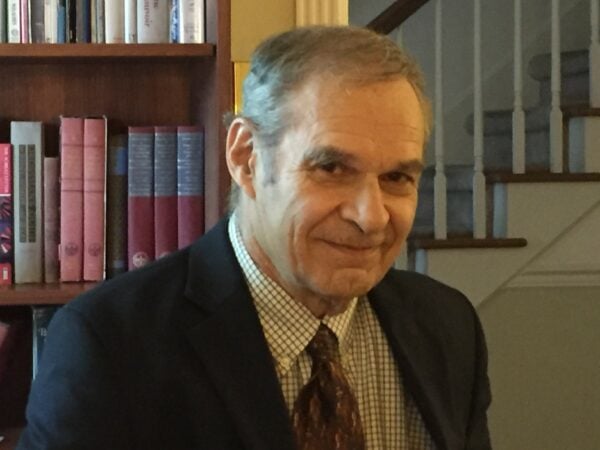Ronald P. Formisano, one of the founders of the “ethnocultural school” of US political history, died peacefully at home in Lexington, Kentucky, on February 20, 2024, following a period of declining health. He was 84 years old.

Photo courtesy Erica Chiquoine-Formisano
Ron was born in Providence, Rhode Island, on March 31, 1939, and grew up next door in Bristol, a proud son of the Ocean State’s vibrant Italian American community. He earned a BA at Brown University, where he played football, and an MA from the University of Wisconsin–Madison before receiving his PhD from Wayne State University. Ron taught at the University of Pittsburgh, the University of Rochester, Clark University, and the University of Florida before becoming the William T. Bryan Chair of American History at the University of Kentucky, where he taught until his retirement in 2015.
Ron was the author of 10 scholarly books on US political history from the 19th century to the new millennium. He published more than a dozen articles in scholarly journals, including the American Historical Review, the Journal of American History, and the American Political Science Review. After retiring, he tried his hand at what he called “muckraking fiction” with a series of four detective novels, culminating in Auditioning for Hell (2023).
Along with his Wayne State mentor, Lee Benson, Ron was among the first US historians to analyze census data and voting records quantitatively to highlight the importance of religion, race, and ethnicity in electoral politics. His first two books, The Birth of Mass Political Parties: Michigan, 1827–1861 (Princeton Univ. Press, 1971) and The Transformation of Political Culture: Massachusetts Parties, 1790s–1840s (Oxford Univ. Press, 1983), showed how social movements intersected with political ideology to undermine America’s “second party system” during the first half of the 19th century.
Before long, Ron shifted his focus to the rise of grassroots politics in New England during the mid-20th century. In Boston against Busing: Race, Class, and Ethnicity in the 1960s and 1970s (Univ. of North Carolina Press, 1991), he showed how resentment against the city’s liberal elite combined with racism to ignite working-class activism in Boston’s ethnic neighborhoods. And in The Great Lobster War (Univ. of Massachusetts Press, 1997), he pieced together the little-known story of Maine lobstermen who banded together in the 1950s to challenge corporate control of their livelihood only to find themselves on the wrong end of a federal antitrust lawsuit.
By the end of his career, Ron was determined to help the American public understand the historical roots of our 21st-century dysfunctional politics. To this end, he published a provocative tetralogy—For the People: American Populist Movements from the Revolution to the 1850s (Univ. of North Carolina Press, 2008); The Tea Party: A Brief History (Johns Hopkins Univ. Press, 2012); Plutocracy in America: How Increasing Inequality Destroys the Middle Class and Exploits the Poor (Johns Hopkins Univ. Press, 2015); and American Oligarchy: The Permanent Political Class (Univ. of Illinois Press, 2017).
Beyond his wide-ranging scholarly work, Ron was also an outstanding teacher and mentor. He won teaching awards in Worcester and Gainesville; he supervised more than 20 PhD dissertations at Clark, Florida, and Kentucky; and he held Fulbright lectureships at the University of Rome and the University of Bologna. Ron’s commitment to the discipline was equally impressive. Over the years, he was elected president of the New England Historical Association, he served as the AHA’s representative on the National Historical Publications and Records Commission, and, most recently, he was a member of the editorial board of the Journal of the Early Republic.
Whether Ron was reinterpreting political history at a conference or playing a pickup game of touch football, he was a fierce competitor who hated to lose. He fell in love with the Maine coast during the 1970s and spent his summers on Chebeague Island in Casco Bay. Those of us who knew Ron will remember him not only for his sharp wit and his fiery temper but also for his kindness and his unstinting devotion to his friends and colleagues. He is survived by his wife of 35 years, Erica Chiquoine-Formisano, and two children, Laura and Matthew.
Dana Caldemeyer
Alabama A&M University
Douglas Little
Clark University
This work is licensed under a Creative Commons Attribution-NonCommercial-NoDerivatives 4.0 International License. Attribution must provide author name, article title, Perspectives on History, date of publication, and a link to this page. This license applies only to the article, not to text or images used here by permission.